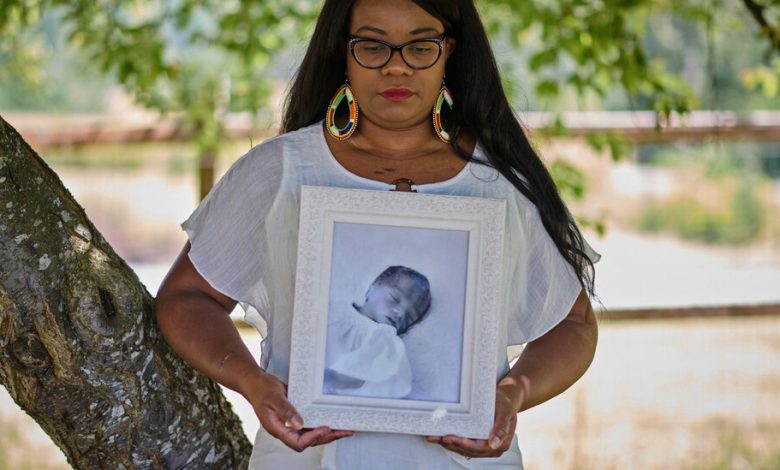How Unconscious Bias in Health Care Puts Pregnant Black Women at Higher Risk

Shakima Tozay was 37 years old and six months pregnant when a nurse, checking the fetal heart rate of the baby boy she was carrying, referred to him as “a hoodlum.”
Ms. Tozay, a social worker, froze. She had just been hospitalized at Providence Regional Medical Center in Everett, Wash., with pre-eclampsia, a life-threatening complication of pregnancy, and she is Black.
“A ‘hoodlum’?” she said. “Why would you call him that?”
The fetus was 14 inches long and weighed little more than a box of chocolates.
A doctor who came into the room downplayed the comment, saying the nurse was just kidding, but that only hurt Ms. Tozay more. She was already distressed: She and her husband lost an earlier twin pregnancy, and now she worried this baby was at risk, too. The hospital later apologized for the nurse’s behavior, but the damage was done.
Black women , who die of pregnancy-related complications at two to three times the rate of white women, say that remarks like these, often made when they are most vulnerable, reflect pervasive bias in the medical system. They report that medical staff don’t listen to them when they complain of symptoms, and dismiss or downplay their concerns. Studies validate their experiences: Analyses of taped conversations between physicians and patients have found that doctors dominate the conversation more with Black patients and don’t ask as many questions as they do of white patients. In medical notes, doctors are more likely to express skepticism about the symptoms Black patients report.
Hovering over these experiences is the stark reality that Black women have worse pregnancy outcomes, lose more infants in the first year of life and have higher rates of preterm birth and stillbirth, when compared with white women. Glaring racial disparities in health outcomes persist between white women and even the wealthiest Black women, and between Black women and white women who experience the same complications.
These findings have forced the medical establishment to acknowledge and confront its biases. Many health systems have mandated anti-bias training for faculty. Some hospital committees that review cases with poor outcomes in order to identify the causes now consider whether racial bias played a role.
Experts who study bias in medical care say that a vast majority of people in the healing professions have good intentions, but that even providers who reject overt racism have internalized cultural stereotypes, and that this unconscious or implicit bias can influence medical care and bedside manner.
“They will say, ‘Hey, I’m not biased,’ and consciously they are not,” said Dr. Cristina M. Gonzalez, a professor of medicine and an associate director at the Institute for Excellence in Health Equity at NYU Langone Health. “But the unconscious runs a lot of the show during the day.”
The brain is wired to make decisions quickly, said Sarah M. Wilson, an assistant professor at Duke University. It uses cognitive shortcuts that let bias seep in, especially when a person is uncertain, tired or stressed — common circumstances in a busy practice or hospital, where providers often treat patients they do not know.
“If it’s a very complicated situation and you have to make a decision at a moment’s notice,” Dr. Wilson said, “then it is very natural to fall back on these automatic assumptions.”
“They sent us away”
Ms. Tozay was sent home from the hospital that evening in 2017 on bed rest. Pre-eclampsia, a serious condition that causes extremely high blood pressure, can lead to preterm birth, stillbirth, organ damage and ultimately eclampsia — a sudden seizure that can be deadly for mother and baby.
Ms. Tozay and her husband, Glen Guss, kept a close eye on her blood pressure, measuring it often with a cuff. A few days later, it started climbing precipitously. During pregnancy, hypertension starts when the top number, which is systolic blood pressure, reaches 140 or more, or the bottom number, diastolic blood pressure, reaches 90 or more. One of Ms. Tozay’s systolic pressure readings was in the 190s, Mr. Guss said. Deeply worried, he drove her back to the hospital.
The intake nurse looked concerned and told the couple she would measure Ms. Tozay’s blood pressure again once she had calmed down. Some tests were done, and while Ms. Tozay waited to be seen by a doctor, her pressure declined to 149/81, according to her medical records, still too high.
Then, Ms. Tozay and her husband said, the nurse told them that the attending physician had said Ms. Tozay could go home.
Mr. Guss said in retrospect that the hospital did not give enough weight to factors that put his wife at high risk: her relatively advanced age for childbirth, previous miscarriage, uterine fibroids, low amniotic fluid, contractions early in the pregnancy and the pre-eclampsia diagnosis. He and Ms. Tozay said they never got the chance to tell a doctor that she felt something was very wrong, had been lightheaded and had “a surreal kind of feeling.”
A spokeswoman for the hospital, Melissa Tizon, said only a doctor could have ordered the tests Ms. Tozay was given, but she could not confirm from hospital records whether a physician actually examined her. She said that a physician had been “engaged” in Ms. Tozay’s care, but added, “We can’t tell if the physician was face to face with the patient.” Ms. Tizon said a hospital review of the interaction concluded that it “met the appropriate standards of care.” (Ms. Tozay gave written consent for hospital officials to discuss her care.)
Not having a physician examine a woman who came into the triage room at Ms. Tozay’s stage of pregnancy would be very unusual, said Dr. Tanya K. Sorensen, an obstetrician specializing in high-risk pregnancies who oversees women’s health care for a region of the Providence health system that includes the hospital where Ms. Tozay was treated.
“I wish that I had said, ‘No, I’m not going home,’” Ms. Tozay said recently. “But I didn’t know what was going on. My husband didn’t know. We were trusting that they knew.”
“There were so many red flags saying they should just take him out right away,” Mr. Guss said. “But they sent us away.”
The next morning, the fetus was not moving.
Stereotypes and skepticism
To better understand how bias plays out, I interviewed dozens of Black women who described disturbing experiences with health care providers during their pregnancies. Their accounts were corroborated whenever possible by medical records, emails with providers and other documentation, as well as interviews with family members and hospital officials.
In Ms. Tozay’s case, the hospital spokeswoman, Ms. Tizon, confirmed that Ms. Tozay filed a complaint with the hospital on Nov. 6 about the nurse’s hoodlum remark on Nov. 3. The manager of the hospital’s childbirth center, Lisa Von Herbulis, met with the nurse to discuss her lack of sensitivity and wrote a letter of apology to Ms. Tozay, dated Nov. 16, a copy of which Ms. Tozay shared with The New York Times.
In interviews, many Black women complained of being stereotyped by administrative staff, nurses and doctors and of being repeatedly asked about their marital status and insurance — even when they wore a wedding band, had a hyphenated last name or had private insurance.
“I was always being asked, ‘Where’s your baby daddy?’” said Ruhamah Dunmeyer Grooms, 35, a business analyst and mother who lives outside Charleston, S.C. “I don’t have a baby daddy. I have a husband.”
Black women are more likely to be tested for illicit drugs during labor and delivery than white women, regardless of their history of substance use, and even though they were less likely than white women to test positive, a recent study found.
Other studies indicate that physicians may express less empathy for Black patients, compared with white patients, and their notes reflect a belief that Black patients are less likely to follow medical advice.
They are more likely to describe Black patients as uncooperative or “noncompliant,” and they may prescribe less aggressive treatment because they don’t think Black patients will adhere to it, experts say.
In one study of patient records, researchers found that doctors signal disbelief in the records of Black patients, appearing to question the credibility of their complaints by placing quotation marks around certain words — for example, writing that the patient “had a ‘reaction’ to the medication” — or by describing a complaint with words like “claims” or “insists.”
Failure to take patients seriously and believe their accounts can have deadly consequences.
Shalon Irving, a 36-year-old public health expert at the Centers for Disease Control and Prevention, sought help from doctors at Emory Saint Joseph’s Hospital in Atlanta at least six times in the weeks after her cesarean section, according to her mother, Wanda Irving, who was helping her with the new baby and who accompanied her on three of the visits.
Shalon Irving felt ill, had severe headaches and gained almost 10 pounds, her mother said, but was sent home every time.
“Her blood pressure was so high the last time she went in that the nurse checked it twice,” Wanda Irving said. “She demanded to see the doctor and sat there waiting, but was told he was too busy.”
Within hours of returning home from that last visit, Dr. Irving collapsed and died, her mother said. An independent autopsy determined the cause of death was complications from hypertension. “We need to make doctors accountable for these deaths,” she said. “If it was a crime, they would pay more attention to what the patient is saying.”
A conservator for Dr. Irving’s baby girl, Soleil, reached a financial settlement with Emory Healthcare. The hospital, citing federal medical privacy laws, declined to comment.
Doctors who don’t listen
Black patients say that health providers often disregard and overrule their wishes.
Pregnant Black women are more likely than white women to say they were pressured to undergo cesarean section deliveries and other childbirth interventions, such as epidurals and labor induction, when they sought to avoid them. Although a C-section may be unavoidable when a woman develops complications or the fetus is at risk, it is major surgery and can be more dangerous than a vaginal delivery.
When Tennille Leak-Johnson’s fetus stopped growing at a normal rate, her doctor in Chicago counseled her and her husband about the option of terminating the pregnancy, even before genetic testing was carried out, Dr. Leak-Johnson said. Her doctor also offered the option of placing the infant with a family that wanted to adopt a sick or disabled child.
The doctor, who is no longer practicing in Chicago, did not respond to repeated requests for comment, but Dr. Leak-Johnson’s medical records contain a note her doctor wrote expressing concern about the baby’s health early on in the pregnancy and a lengthy summary of the doctor’s counseling on abortion or adoption.
Fetal growth restriction can signal a serious medical condition in the fetus, but Dr. Leak-Johnson and her husband were unequivocal about wanting to keep the pregnancy.
“I told the doctor that even if I could only love him for one day or one hour, I was not getting rid of him,” said Dr. Leak-Johnson, who has a doctorate in molecular genetics and genomics and was familiar with the medical risks.
Dr. Leak-Johnson said she was a high-risk patient because of her weight, so she saw her doctor frequently. At each appointment, she said, the doctor raised the question of termination — continuing to do so even after genetic testing and a 20-week anatomy scan found neither genetic nor structural abnormalities.
A brief note the doctor put in Dr. Leak-Johnson’s chart after the normal test results reiterated the doctor’s concern that something was wrong with the baby. The only reference the note made to the normal genetic test results, which revealed the sex, was that the fetus was male.
Mid-pregnancy, Dr. Leak-Johnson switched doctors.
Her son, Stanley Johnson III, was born 11 weeks before his due date, and Dr. Leak-Johnson became acutely ill during the delivery. But the baby — who spent two months in neonatal intensive care — survived and has thrived.
He turned 12 this year, and “aside from his wearing glasses because of his prematurity, you wouldn’t even know that he was born a pound and 14 ounces,” Dr. Leak-Johnson said. “He’s the love of my life.”
Prioritizing the mother’s care
A lack of empathy in medical settings can put pregnant women at risk.
In New York State, Assemblywoman Rodneyse Bichotte Hermelyn pushed for a measure, which became law in 2020, that requires hospitals to care for women in preterm labor, after she herself was turned away from Columbia University Irving Medical Center.
Ms. Hermelyn, who was 43 at the time, said her Columbia-affiliated doctor sent her to the hospital in 2016 when her labor started at 22 weeks. She was distraught over the possible loss of the pregnancy, she said, but hospital doctors told her that they were not required to intervene to save the pregnancy at such an early stage in gestation. They told her she was almost three centimeters dilated and that they could not do anything to stop the labor or save the fetus at that stage, she said.
“They said, ‘We can terminate your baby,’ but that was not an option, and made me cry even more,” Ms. Hermelyn said. The doctors told her they had other patients to tend to and “sent me home,” she added.
Columbia University officials refused to comment on the case.
In interviews, experts not involved in the case noted that when preterm labor starts before 24 weeks of gestation, the baby is extremely unlikely to survive, so hospitals do not generally take extraordinary measures to save the fetus. Labor in these cases can be protracted, so a woman who is admitted might be hospitalized for several days.
Ms. Hermelyn turned to Wyckoff Heights Medical Center in Brooklyn, a hospital that predominantly serves patients who are low-income, on Medicaid or uninsured, and where the staff knew her. They admitted her, sought to relieve her emotional distress and tried, but failed, to save the baby.
The mother herself needed care, said Dr. Daniel Faustin, director of Wyckoff’s division of maternal and fetal medicine. Ms. Hermelyn had a high-risk pregnancy, and preterm labor put her at risk of serious infection. If she delivered at home, she would risk deadly hemorrhaging.
“Even if you give up on the baby, you cannot give up on the mother,” he said. “The best place for her to be if she’s going to deliver is in the hospital, to make sure that after this unfortunate experience, her life is not at risk.”
When Ms. Hermelyn gave birth to a son last year, she named him Daniel, after Dr. Faustin.
From tragedy, reforms
After Ms. Tozay and Mr. Guss’s baby stopped moving, they returned to the hospital. Doctors could not find the heartbeat, confirming the couple’s fears. , The placenta had separated from the wall of the uterus, cutting off the flow of oxygen to the baby, a complication that occurs more frequently when the mother has high blood pressure. The baby they planned to name Jaxson was dead.
A hospital doctor who had not cared for her before performed a cesarean section. As she handed the dead newborn to Mr. Guss, the doctor said, “Congratulations — I mean, I’m so sorry for your loss.”
Ms. Tozay and Mr. Guss said they were still reeling from the stillbirth when the doctor told them that she should never have become pregnant, and that they should not try to conceive again.
“I felt blamed, like she was saying: ‘Why would you ever think about having a kid? You just killed your son,’” Ms. Tozay said.
Mr. Guss said, “Even if it was true, it didn’t need to be said right then and there.”
Dr. Sorensen, the executive medical director of Providence, and Dr. Nwando Anyaoku, chief health equity officer, said they did not doubt Ms. Tozay’s recollections. “For her, that moment is probably etched in her mind,” Dr. Anyaoku said.
The doctor who did the C-section might have been exhausted, distracted or distressed, but that did not excuse the lack of sensitivity, Dr. Sorensen said. “The whole case is incredibly heartbreaking,” she said. “That’s not the experience we want to deliver.”
In 2020, Providence invested $50 million to reduce health inequities and racial disparities in maternal outcomes. It has educated its staff about implicit bias and started new programs for pregnant women: JUST Birth Network, which matches pregnant women of color with doulas who help them navigate the health care system, and TeamBirth, a framework for open communication between patients and providers.
The health system is seeking to reduce C-section rates for Black women and to improve care after birth, when many complications occur. Clinical review committees that examine hospital cases have been instructed to consider whether implicit bias played a role in poor outcomes.
A Washington State initiative aimed at improving outcomes for women with pre-eclampsia encourages health providers to give pregnant women with high blood pressure blue wristbands to draw attention to the condition — and to ensure no doctor or nurse overlooks it.
Ms. Tozay and Mr. Guss have decided not to try another pregnancy, though her regular obstetrician said it would be safe to do so.
“The words of the delivering doctor will always stick with me,” Ms. Tozay said. “Doctors need to realize that what they say carries power and weight.”




